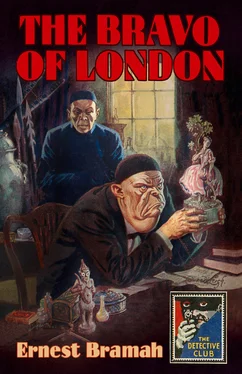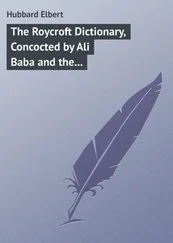1 ...6 7 8 10 11 12 ...16 ‘Had we better go before anyone comes, sir?’ suggested Parkinson, decorously alarmed. ‘As yet the shop is empty.’
‘No!’ was the reply, as though forced out with an effort. ‘No—face it!’ He turned as he spoke towards the opening door and on the word the uncouth figure, laboriously negotiating the awkward corners, entered. ‘Ah, at last!’
‘Well, you see, sir,’ explained Mr Joolby, now the respectful if somewhat unconventional shopman in the presence of a likely customer, ‘I move slowly so you must excuse being kept waiting. And my boy here—well-meaning fellow but so economical even of words that each one has to do for half a dozen different things—quite different things sometimes.’
‘Man come. Say “Can do”; say “No can do”. All same; go tell; come see,’ protested Won Chou, retiring to some obscure but doubtless ingeniously arranged point of observation, and evidently cherishing a slight sense of unappreciation.
‘Exactly. Perfectly explicit.’ Mr Joolby included his visitors in his crooked grin of indulgent amusement. ‘Now those poisoned weapons you wrote about. I’ve looked them up and I have a wonderful collection and, what is very unusual, all in their original condition. This,’ continued Mr Joolby, busying himself vigorously among a pile of arrows with padded barbs, ‘is a very fine example from Guiana—it guarantees death with convulsions and foaming at the mouth within thirty seconds. They’re getting very rare now because since the natives have become civilized by the missionaries they’ve given up their old simple ways of life—they will have our second-hand rifles because they kill much further.’
‘Highly interesting,’ agreed the customer, ‘but in my case—’
‘Or this beautiful little thing from the Upper Congo. It doesn’t kill outright, but, the slightest scratch—just the merest pin prick—and you turn a bright pea green and gradually swell larger and larger until you finally blow up in a very shocking manner. The slightest scratch—so,’ and in his enthusiasm Mr Joolby slid the arrow quickly through his hand towards Parkinson whose face had only too plainly reflected a fascinated horror from the moment of their host’s appearance. ‘Then the tapioca-poison group from Bolivia—’
‘Save yourself the trouble,’ interrupted the blind man, who had correctly interpreted his attendant’s startled movement. ‘I’m not concerned with—the primitive forms of murder.’
‘Not—?’ Joolby pulled up short on the brink of another panegyric, ‘not with poisoned arrows? But aren’t you the Mr Brooks who was to call this afternoon to see what I had in the way of—?’
‘Some mistake evidently. My name is Carrados and I have made no appointment. Antique coins are my hobby—Greek in particular. I was told that you might probably have something in that way.’
‘Coins; Greek coins.’ Mr Joolby was still a little put out by the mischance of his hasty assumption. ‘I might have; I might have. But coins of that class are rather expensive.’
‘So much the better.’
‘Eh?’ Customers in Padgett Street did not generally, one might infer, express approval on the score of dearness.
‘The more expensive they are, the finer and rarer they will be—naturally. I can generally be satisfied with the best of anything.’
‘So—so?’ vaguely assented the dealer, opening drawer after drawer in the various desks and cabinets around and rooting about with elaborate slowness. ‘And you know all about Greek coins then?’
‘I hope not,’ was the smiling admission.
‘Hope not? Eh? Why?’
‘Because there would be nothing more to learn then. I should have to stop collecting. But doubtless you do?’
‘If I said I did—well, my mother was a Greek so that it should come natural. And my father was a—um, no; there was always a doubt about that man. But one grandfather was a Levantine Jew and the other an Italian cardinal. And one grandmamma was an American negress and the other a Polish revolutionary.’
‘That should ensure a tolerably versatile stock, Mr Joolby.’
‘And further back there was an authentic satyr came into the family tree—so I’m told,’ continued Mr Joolby, addressing himself to his prospective customer but turning to favour the scandalised Parkinson with an implicatory leer. ‘You find that amusing, Mr Carrados, I’m sure?’
‘Not half so amusing as the satyr found it I expect,’ was the retort. ‘But come now—’ for Mr Joolby had meanwhile discovered what he had sought and was looking over the contents of a box with provoking deliberation.
‘To be sure—you came for Greek coins, not for Greek family history, eh? Well, here is something very special indeed—a tetradrachm struck at Amphipolis, in Macedonia, by some Greek ruler of the province but I can’t say who. Perhaps Mr Carrados can enlighten me?’
Without committing himself to this the blind man received the coin on his outstretched hand and with subtile fingers delicately touched off the bold relief that still retained its superlative grace of detail. Next he weighed it carefully in a cupped palm, and then after breathing several times on the metal placed it against his lips. Meanwhile Parkinson looked on with the respect that he would have accorded to any high-class entertainment; Joolby merely sceptically indifferent.
‘Yes,’ announced Carrados at the end of this performance, ‘I think I can do that. At all events I know the man who made it.’
‘Come, come, use your eyes, my good sir,’ scoffed Mr Joolby with a contemptuous chuckle. ‘I thought you understood at least something about coins. This isn’t—I don’t know what you think—a Sunday school medal or a stores ticket. It’s a very rare and valuable specimen and it’s at least two thousand years old. And you “know the man who made it”!’
‘I can’t use my eyes because my eyes are useless: I am blind,’ replied Carrados with unruffled evenness of temper. ‘But I can use my hands, my finger-tips, my tongue, lips, my commonplace nose, and they don’t lead me astray as your credulous, self-opinionated eyes seem to have done—if you really take this thing for a genuine antique,’ and with uncanny proficiency he tossed the coin back into the box before him.
‘You can’t see—you say that you are blind—and yet you tell me, an expert, that it’s a forgery!’
‘It certainly is a forgery, but an exceptionally good one at that—so good that no one but Pietro Stelli, who lives in Padua, could in these degenerate days have made it. Pietro makes such beautiful forgeries that in my less experienced years they have taken even me in. Of course I couldn’t have that so I went to Padua to find out how he worked, and Peter, who is, according to his lights, as simple and honest a soul as ever breathed, willingly let me watch him at it.’
‘And how,’ demanded Mr Joolby, seeming almost to puff out aggression towards this imperturbable braggart; ‘how could you see him what you call “at it”, if, as you say, you are blind? You are just a little too clever, Mr Carrados.’
‘How could I see? Exactly as I can see’—stretching out his hand and manipulating the extraordinarily perceptive fingers meaningly—‘any of the ingenious fakes which sharp people offer the blind man; exactly as I could see any of the thousand and one things that you have about your shop. This’—handling it as he seemed to look tranquilly at Mr Joolby—‘this imitation Persian prayer-rug with its lattice-work design and pomegranate scroll, for instance; exactly as I could, if it were necessary, see you ,’ and he took a step forward as though to carry out the word, if Mr Joolby hadn’t hastily fallen back at the prospect.
Читать дальше












